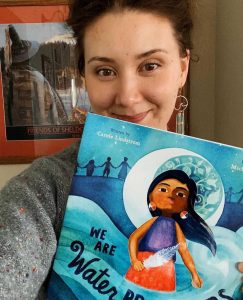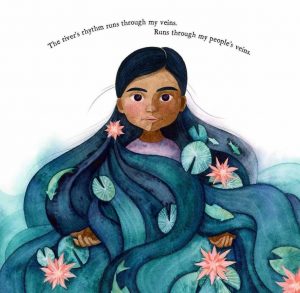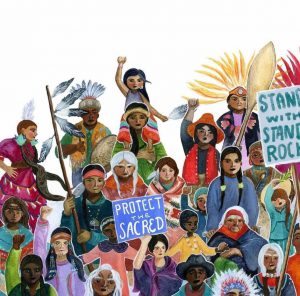- Slug: BC-CNS Indigenous Illustrator, 515 words.
- 3 photos and captions below.
- 1 video here. Credit Brianna Alexander/Cronkite News
By Brianna Alexander
Cronkite News
Alaska artist Michaela Goade has made history, becoming the first Indigenous illustrator to win the prestigious Randolph Caldecott Medal for best American picture book for children for her illustrations in “We Are Water Protectors.”
The book, written by Carole Lindstrom, was inspired by Indigenous-led movements across North America, including the protests led by the Standing Rock Sioux against the Dakota Access Pipeline.
“I really wanted to make Standing Rock water protectors and water protectors around the world proud,” said Goade, who an enrolled member of the Tlingit and Haida Indian Tribes of Alaska. “I wanted them to feel seen. And then, within that, there’s a lot of other elements I wanted to bring forward and really speak for Mother Earth.”
Goade used her illustrations not only to help show the need to protect the planet’s natural resources but to show diversity within Indigenous culture. Children need to hear and see that message, she said.
“Children are seeing what we are telling them, and that is important and valued,” Goade said. “If we give them diversity and inclusion, it not only helps Indigenous children feel seen and valued and important, it also helps non-Indigenous children and adults see a whole range of lived experiences.”
The Caldecott Medal, named for the 19th century British illustrator, has been awarded annually by the children’s division of the American Library Association since 1937.
Sean George, south region manager for the Phoenix Public Library, said Goade’s work inspires him. It’s vital for Native Americans to be correctly represented in books.
“I myself am mixed-blood Choctaw, Muskogee as well as European, American heritage – so you know it’s a very important topic to me,” George said. “People come to literature for a lot of different reasons, but very often it involves looking for some sort of reflection of our own experience – and what we read – so that we can feel some sort of affirmation or validation, but also (it’s) important to see the rest of the world, or perhaps, other worlds outside of our experience.”
George, who has been a youth librarian, said children have confided to him their frustrations over the misrepresentation of Indigenous cultures in books.
“I’ve known children that have expressed a lot of pain and frustration overseeing books that describe or represent Indigenous people and children as less than,” George said.
Too often, Native Americans are stereotyped as “savages,” he said.
“I know children who’ve said that that’s not the way our culture is, that’s not the way my family is, that’s not the way my grandparents were.”
Instead, George said, “We Are Water Protectors” reflects the rich identity of Native Americans.
“To see a book show you a mirror, when you’ve gone so long and never seen one – it’s a huge, huge impact. So very personal,” he said.
Goade said her award is a sign of the future.
“I might be the first, but I definitely won’t be the last, and that is a really, really wonderful thing,” she said.
For more stories from Cronkite News, visit cronkitenews.azpbs.org.
^__=


